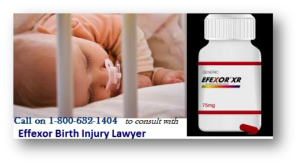Laura, a Tennessee mother in her thirties, is worried over the future of her son born with an Effexor birth defect four years ago. She lost her job and had family problems. Her doctor suggested Effexor antidepressant as a treatment to her anxiety, panic, and depression. She continued taking the drug until the eight week into her pregnancy unaware of what the antidepressant could cause to the baby in her womb. She was hopeful of Effexor benefits in keep her emotional health stable and prevent the depression from impacting the child inside.
Her hope was shattered when doctors used the term “Effexor Baby” to indicate the special condition of her yet-to-born son soon after labor pain began. The boy was put into the neonatal intensive care for days after the birth. Medical examinations revealed he had a fused heart, irregular heartbeat, and other cardiac complications. As her son grew up, Laura came to know more about Effexor birth defects linked to pregnancy and many cases similar to her. At four, the boy continued to receive special care for his heart condition, low immunity, and persistent respiratory problems. Laura is one of the hundreds of parents who have filed Effexor birth defect lawsuits seeking damages.
Things To Know About Effexor Birth Defects
- Effexor, a serotonin-norepinephrine reuptake inhibitor, contains Venlafaxine that regulates neurotransmitters responsible for mood swing.
- The drug was first introduced in 1993. Wyeth was the original manufacturer of the antidepressant. Pfizer took over Wyeth in 2009 and it now owns the brand Effexor.
- Effexor is prescribed to treat anxiety, depression, and panic disorders. The drug is also used in case of bipolar disorder, diabetic neuropathy, and migraines.
- The SNRI antidepressant use during has been linked to fatal birth defects, such as persistent pulmonary hypertension. This lung-disabling disorder is the key deformity behind the development of the acronym “Effexor Baby.”
- The medication is also associated with many types of heart deformities, such as septal heart, fused heart, hole in the heart, ventral and atrial defects, underdeveloped valves, septum wall defects, and omphalocele, in newborns.
- Other Zoloft birth defect side effects include hypoxemia, intra-cardiac blood shunting, cranial defects, brain and skull malformations, slow brain development, speech impairment, growth delays, deformities in vertebra, defective neural tube, and various physical deformities.
- In 2006, a study published in the New England Journal of Medicine warned of six-time higher risk of PPHN in babies born to mothers using the antidepressant after 20th week of pregnancy. Health Canada issued a public health warning regarding Effexor pregnancy side effects same year.
- The British Medical Journal has published many research reports linking the antidepressant to birth defects. A 2009 study warned of twice higher risk of heart problems while another reported in 2013 made autism risk claims based on the study of over 100,000 patients. In 2014, a third one reportedly discovered that Effexor ingestion by pregnant women enhanced the risk giving birth to children with PPHN by 2.5 times.
- Studies by Swedish and English scholars have discovered links between the antidepressant and brain malformations, neurological disorders, vertebra deformities, and anencephaly in newborns.
If your child is a victim of Effexor birth defect and you are willing to seek financial damages for product liability, please contact our Effexor birth defect lawyer or call on 1-800-632-1404 for a free consultation.
